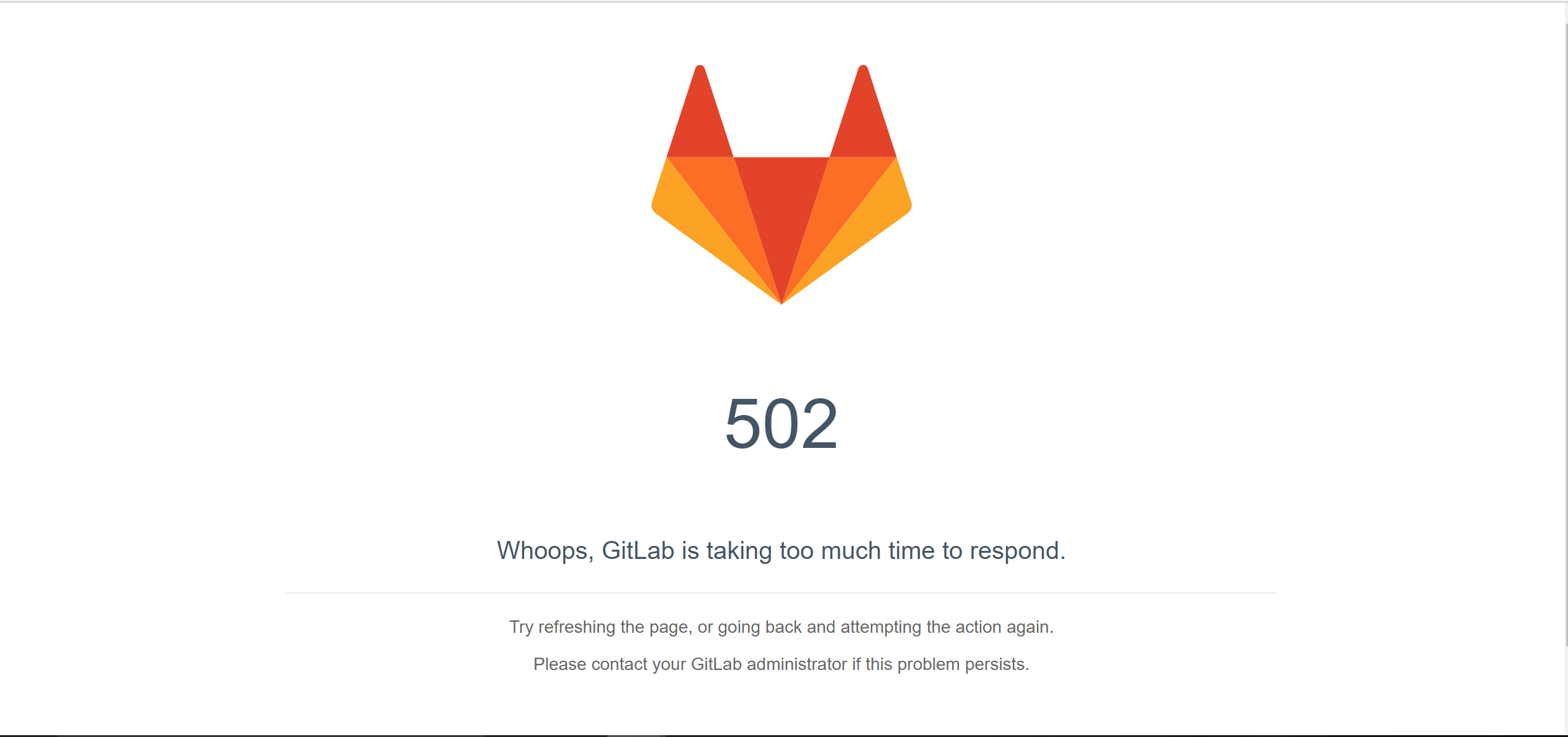This is a monolithic image of GitLab running all the necessary services in a single container, using docker-compose. GitLab is an open source end-to-end software development platform with built-in version control, issue tracking, code review, CI/CD, and more.
- MySQL or PostgreSQL are for persistent database information (e.g. users, permissions, issues, other metadata)
- Sidekiq is used as a job queue
- Redis is used as a non-persistent database backend for job information, metadata, and incoming jobs
- Nginx is used as a web front end to proxypass the Unicorn web server.
- more description about architecture is here
- size of a GitLab image: 1.16GB
- 4GB RAM is the recommended memory size for all installations and supports up to 100 users
- at least 2GB of swap, even if there is currently enough available RAM. Having swap will help reduce the chance of errors occurring if available memory changes.
- size of the repos
- 2 cores is the recommended number of cores and supports up to 500 users
- 80
- 11
- 443
docker-compose up -d- Type in browser
gitlab.example.comand you'll see the GitLab login page - You register there (admin account has a username "root" and a password that you typed at the beginning)
- Create projects and use great GitLab features
- If while connecting to
gitlab.example.comyou see in browser first this :
Then in some time this :
Then you should wait approximately 5 minutes.
- While pushing some changes to GitLab, you become
413 (Request Entity Too Large)error. It means that the size of files that you push exceeds the configured value. In this case set label"rap.client_max_body_size"to a bigger value (e.g rap.client_max_body_size: 300m)or to 0. 0 disables checking of of client request body size.
docker-compose.yml was created on a base of an example from official Gitlab documentation
Due to the fact that docker-compose seems not to support more than 1 env variable if you use multi-line variables, you can use the "env_file" parameter.
services:
gitlab:
image: gitlab/gitlab-ce:10.5.2-ce.0
env_file:
- ./.env
environment:
GITLAB_OMNIBUS_CONFIG: |
external_url 'https://gitlab.example.com' .env.default file:
# env sourced from .env file
LDAPNAME=ldap.mydomain.com
PASSWORD=12345678
It is recommended to backup /etc/gitlab (all configuration for omnibus-gitlab is stored here), or at least of /etc/gitlab/gitlab-secrets.json.
To backup /etc/gitlab directory just run following command :
#Create a time-stamped .tar file
docker exec -t <your container name> /bin/sh -c 'umask 0077; tar cfz /secret/gitlab/backups/$(date "+etc-gitlab-\%s.tgz") -C / etc/gitlab'
To backup application :
docker exec -t <your container name> gitlab-rake gitlab:backup:create
To restore a backup, you will need to restore /etc/gitlab/gitlab-secrets.json (for Omnibus packages) or /home/git/gitlab/.secret (for installations from source). Pay attention, that :
- The restore target directories are empty. Otherwise GitLab will attempt to move these directories before restoring the new data and this would cause an error.
- The backup tarball are available in the backup location (default location is /var/opt/gitlab/backups).
The restore task can be run from host using the command:
docker exec -it <name of container> gitlab-rake gitlab:backup:restore
- Configurations in docker-compose.yml file in
"GITLAB_OMNIBUS_CONFIG: |"part to make connection with LDAP server:
gitlab_rails['ldap_enabled'] = true
gitlab_rails['ldap_servers'] = YAML.load <<-EOS
main:
label: 'LDAP' # name for your LDAP server that will be shown on the web page
host: '_your_ldap_server' # Example: 'ldap.mydomain.com'
port: '389' # 636 for SSL
uid: 'sAMAccountName'
bind_dn: '_the_full_dn_of_the_user_you_will_bind_with'
password: '_the_password_of_the_bind_user'
active_directory: 'false' # This setting specifies if LDAP server is Active Directory LDAP server
base: '' # Base where we can search for users
method:'plain' # Encryption method. "start_tls" which is tls or "simple_tls" which is ssl or "plain"
EOS- In our docker-compose.yml were used following configurations to test connection between GitLab and Remote LDAP server:
gitlab_rails['ldap_enabled'] = true
gitlab_rails['ldap_servers'] = YAML.load <<-EOS
main:
label: 'LDAP'
host: 'www.zflexldap.com'
port: '389'
uid: 'uid'
bind_dn: 'cn=ro_admin,ou=sysadmins,dc=zflexsoftware,dc=com'
password: 'zflexpass'
encryption: 'plain'
active_directory: 'false'
base: 'dc=zflexsoftware,dc=com'
EOS-
to check if ldap works fine :
docker exec -it <your container name> gitlab-rake gitlab:ldap:check -
notice, that the field "uid" can be set to "sAMAccountName" (Windows AD) or "uid" (OpenLDAP). E.g. in our case we use OpenLDAP, so "uid: 'uid'" otherwise GitLab will not see LDAP users.
-
notice that by default LDAP service listens for connections on TCP and UDP port 389. LDAPS (LDAP over SSL) listens on port 636.
By default, GitLab uses PostgreSQL server that is already included in Omnibus GitLab. You can also reconfigure it to use an external instance of PostgreSQL.
- Configurations in docker-compose.yml file in
"GITLAB_OMNIBUS_CONFIG: |":
# Disable the built-in Postgres
postgresql['enable'] = false
# connection details for database.yml
gitlab_rails['db_username'] = "gitlab"
gitlab_rails['db_password'] = "gitlab"
gitlab_rails['db_host'] = "postgresql"
gitlab_rails['db_port'] = "5432"
gitlab_rails['db_database'] = "gitlabhq_production"
gitlab_rails['db_adapter'] = 'postgresql'
gitlab_rails['db_encoding'] = 'utf8'
- Create PostgreSQL service :
postgresql:
restart: always
image: postgres:9.6.2-alpine #use PostgreSQL 9.6 version
environment:
- POSTGRES_USER=gitlab
- POSTGRES_PASSWORD=gitlab
- POSTGRES_DB=gitlabhq_production
volumes:
- postgresql:/var/lib/postgresql:rw
Create Gitlab Runner as a sidecar :
gitlab-runner-sidecar:
image: gitlab/gitlab-runner:latest
restart: always
volumes:
- gitlab-runner-config:/etc/gitlab-runner \
- /var/run/docker.sock:/var/run/docker.sock \
- ERROR: starting container process caused "exec: "./nameofscript.sh": permission denied"
- SOLUTION: use ENTRYPOINT ["/bin/sh", "./nameofscript.sh"] if you want to execute script in DOCKERFILE





